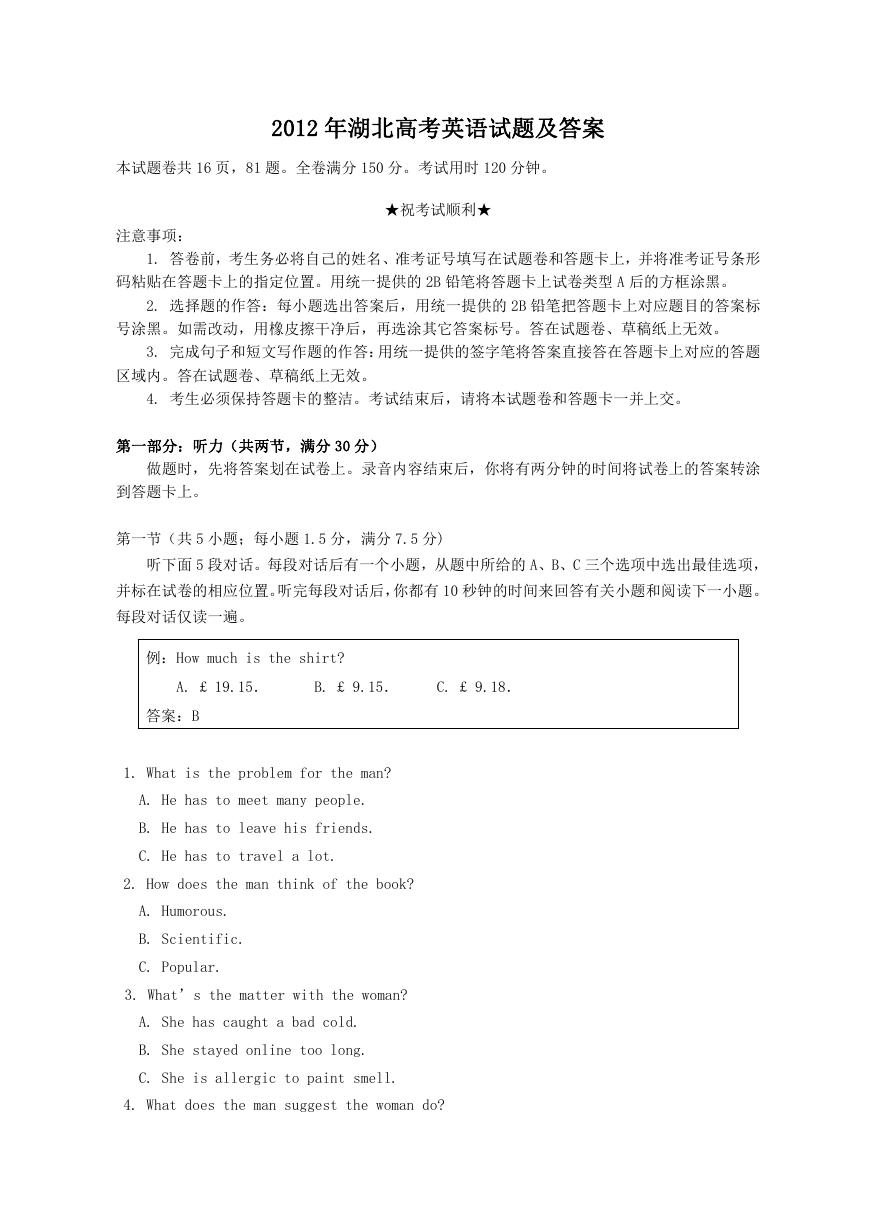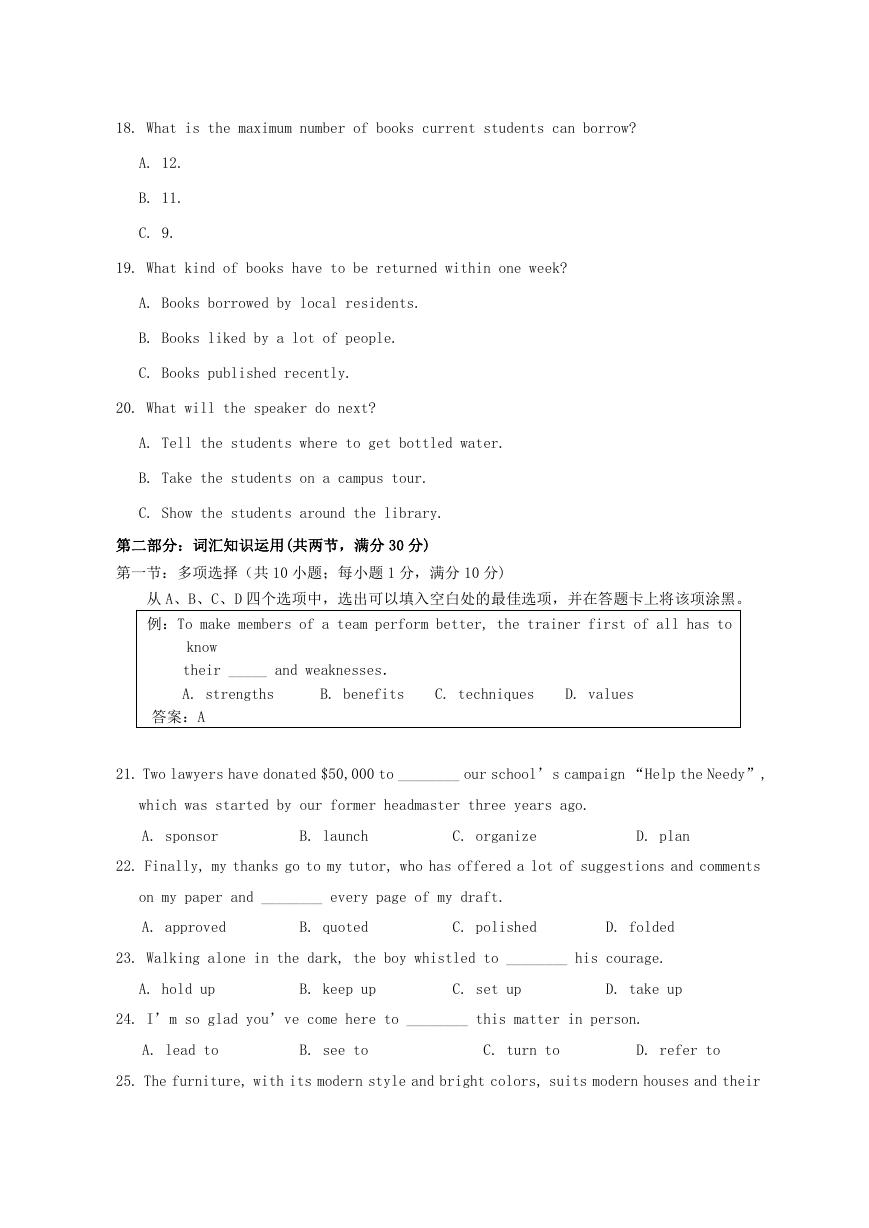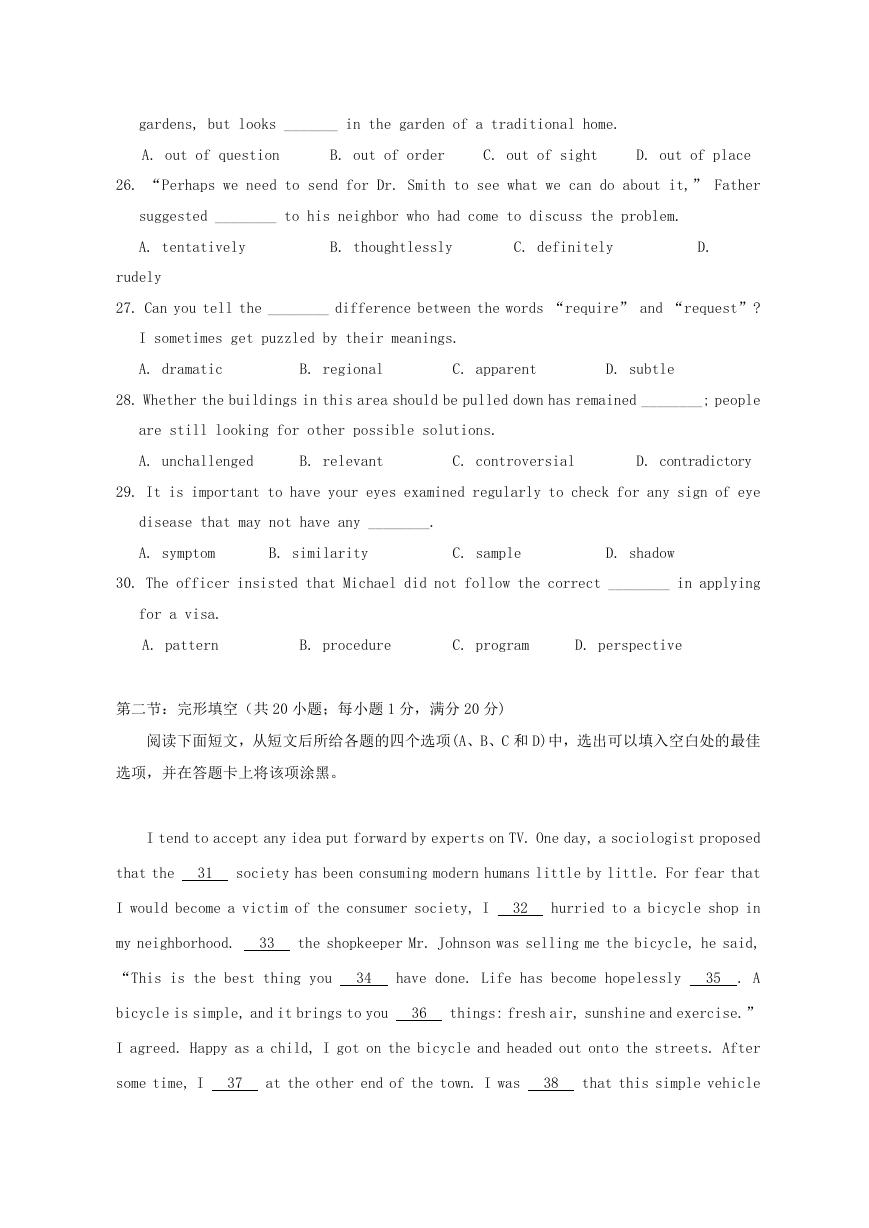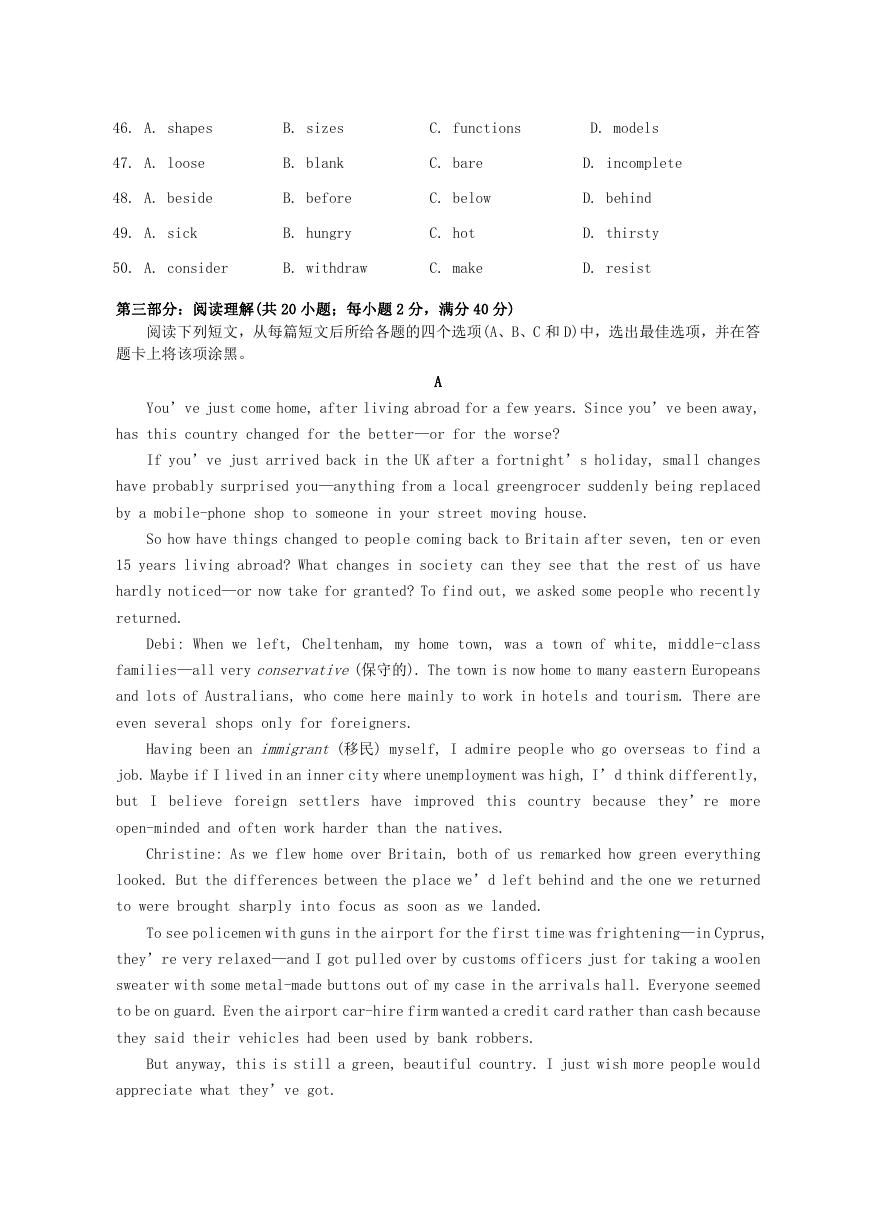2012 年湖北高考英语试题及答案
本试题卷共 16 页,81 题。全卷满分 150 分。考试用时 120 分钟。
注意事项:
★祝考试顺利★
1. 答卷前,考生务必将自己的姓名、准考证号填写在试题卷和答题卡上,并将准考证号条形
码粘贴在答题卡上的指定位置。用统一提供的 2B 铅笔将答题卡上试卷类型 A 后的方框涂黑。
2. 选择题的作答:每小题选出答案后,用统一提供的 2B 铅笔把答题卡上对应题目的答案标
号涂黑。如需改动,用橡皮擦干净后,再选涂其它答案标号。答在试题卷、草稿纸上无效。
3. 完成句子和短文写作题的作答:用统一提供的签字笔将答案直接答在答题卡上对应的答题
区域内。答在试题卷、草稿纸上无效。
4. 考生必须保持答题卡的整洁。考试结束后,请将本试题卷和答题卡一并上交。
第一部分:听力(共两节,满分 30 分)
做题时,先将答案划在试卷上。录音内容结束后,你将有两分钟的时间将试卷上的答案转涂
到答题卡上。
第一节(共 5 小题;每小题 1.5 分,满分 7.5 分)
听下面 5 段对话。每段对话后有一个小题,从题中所给的 A、B、C 三个选项中选出最佳选项,
并标在试卷的相应位置。听完每段对话后,你都有 10 秒钟的时间来回答有关小题和阅读下一小题。
每段对话仅读一遍。
例:How much is the shirt?
A. £ 19.15.
B. £ 9.15.
C. £ 9.18.
答案:B
1. What is the problem for the man?
A. He has to meet many people.
B. He has to leave his friends.
C. He has to travel a lot.
2. How does the man think of the book?
A. Humorous.
B. Scientific.
C. Popular.
3. What’s the matter with the woman?
A. She has caught a bad cold.
B. She stayed online too long.
C. She is allergic to paint smell.
4. What does the man suggest the woman do?
�
A. Consult a repair shop.
B. Purchase another car.
C. Fix the car herself.
5. In which year is the man in college now?
A. The first year.
B. The second year.
C. The third year.
第二节(共 15 小题;每小题 1.5 分,满分 22.5 分)
听下面 5 段对话或独白。每段对话或独白后有几个小题,从题中所给的 A、B、C 三个选项中
选出最佳选项,并标在试卷的相应位置。听每段对话或独白前,你将有时间阅读各个小题,每小
题 5 秒钟;听完后,各小题将给出 5 秒钟的作答时间。每段对话或独白读两遍。
听第 6 段材料,回答第 6、7 题。
6. What has the woman ordered for herself?
A. Milk.
B. Juice.
C. Coffee.
7. Why does the man recommend strawberry juice?
A. It’s sweeter.
B. It’s fresher.
C. It’s colder.
听第 7 段材料,回答第 8、9 题。
8. Why is Jane upset?
A. David fell in love with her.
B. Kevin made up stories about her.
C. She made a mistake in calculation.
9. What is the probable relationship between the speakers?
A. Teacher and student.
B. Father and daughter.
C. Employer and employee.
听第 8 段材料,回答第 10 至 12 题。
10. How far away is Hill Farm?
A. Nearly a mile.
B. Just one mile.
�
C. More than a mile.
11. Which is the route to Hill Farm?
A. Left track → bridge → road.
B. Road → left track → bridge.
C. Bridge → road → left track.
12. What would the man like the woman to do towards the end of the conversation?
A. Give him a ride.
B. Repeat what she said.
C. Walk him to Hill Farm.
听第 9 段材料,回答第 13 至 16 题。
13. What is the woman doing?
A. Hosting a TV show.
B. Giving a lecture on poetry.
C. Conducting a radio debate.
14. How did the man’s mother contribute to his success in poetry?
A. She sent him to poetry classes.
B. She taught him to write business plans.
C. She asked him to read from early childhood.
15. What does the man find most difficult in writing?
A. Choosing the right words.
B. Describing real experiences.
C. Getting an appropriate opportunity.
16. What does the man say about his own writing?
A. Creative.
B. Successful.
C. Encouraging.
听第 10 段材料,回答第 17 至 20 题。
17. How do students enter the library?
A. With a library account.
B. With a student card.
C. With a password.
�
18. What is the maximum number of books current students can borrow?
A. 12.
B. 11.
C. 9.
19. What kind of books have to be returned within one week?
A. Books borrowed by local residents.
B. Books liked by a lot of people.
C. Books published recently.
20. What will the speaker do next?
A. Tell the students where to get bottled water.
B. Take the students on a campus tour.
C. Show the students around the library.
第二部分:词汇知识运用(共两节,满分 30 分)
第一节:多项选择(共 10 小题;每小题 1 分,满分 10 分)
从 A、B、C、D 四个选项中,选出可以填入空白处的最佳选项,并在答题卡上将该项涂黑。
例:To make members of a team perform better, the trainer first of all has to
know
their _____ and weaknesses.
A. strengths
B. benefits
C. techniques
D. values
答案:A
21. Two lawyers have donated $50,000 to ________ our school’s campaign “Help the Needy”,
which was started by our former headmaster three years ago.
A. sponsor
B. launch
C. organize
D. plan
22. Finally, my thanks go to my tutor, who has offered a lot of suggestions and comments
on my paper and ________ every page of my draft.
A. approved
B. quoted
C. polished
D. folded
23. Walking alone in the dark, the boy whistled to ________ his courage.
A. hold up
B. keep up
C. set up
D. take up
24. I’m so glad you’ve come here to ________ this matter in person.
A. lead to
B. see to
C. turn to
D. refer to
25. The furniture, with its modern style and bright colors, suits modern houses and their
�
gardens, but looks _______ in the garden of a traditional home.
A. out of question
B. out of order
C. out of sight
D. out of place
26. “Perhaps we need to send for Dr. Smith to see what we can do about it,” Father
suggested ________ to his neighbor who had come to discuss the problem.
A. tentatively
B. thoughtlessly
C. definitely
D.
rudely
27. Can you tell the ________ difference between the words “require” and “request”?
I sometimes get puzzled by their meanings.
A. dramatic
B. regional
C. apparent
D. subtle
28. Whether the buildings in this area should be pulled down has remained ________; people
are still looking for other possible solutions.
A. unchallenged
B. relevant
C. controversial
D. contradictory
29. It is important to have your eyes examined regularly to check for any sign of eye
disease that may not have any ________.
A. symptom
B. similarity
C. sample
D. shadow
30. The officer insisted that Michael did not follow the correct ________ in applying
for a visa.
A. pattern
B. procedure
C. program
D. perspective
第二节:完形填空(共 20 小题;每小题 1 分,满分 20 分)
阅读下面短文,从短文后所给各题的四个选项(A、B、C 和 D)中,选出可以填入空白处的最佳
选项,并在答题卡上将该项涂黑。
I tend to accept any idea put forward by experts on TV. One day, a sociologist proposed
that the
31
society has been consuming modern humans little by little. For fear that
I would become a victim of the consumer society, I
32
hurried to a bicycle shop in
my neighborhood.
33
the shopkeeper Mr. Johnson was selling me the bicycle, he said,
“This is the best thing you
34
have done. Life has become hopelessly
35
. A
bicycle is simple, and it brings to you
36
things: fresh air, sunshine and exercise.”
I agreed. Happy as a child, I got on the bicycle and headed out onto the streets. After
some time, I
37
at the other end of the town. I was
38
that this simple vehicle
�
could let me
39
long distances in a fairly short time. But how
40
did I really
go?
Since I hated to be
41
, I went back to Mr. Johnson and asked him to
42
an
odometer ( 里 程 表 ) on my bicycle. He agreed, but
43
, “An odometer without a
speedometer (速度计) is like a
44
without a knife.” I admitted he was right and in
a few minutes, the two devices(装置) were
45
to the handlebars of my bicycle. “What
about a horn?” he then asked. “Look, this horn is no larger than a matchbox and has
many
46
.” Attracted by these functions, I bought the horn.
“You can’t leave the back part
47
,” noted Mr. Johnson. He fixed a metal box
with buttons
48
the seat, and said, “Is there anything better than this oven when
you feel
49
on your way? I can give you a special discount.” I was not strong enough
to
50
the offer.
“I congratulate you once more; this is the best thing you could have done,” said
Mr. Johnson in the end.
31. A. adult
B. human
C. consumer
D. bachelor
32. A. eventually
B. immediately
C. reluctantly
D. gratefully
33. A. Although
B. Because
C. As
34. A. would
B. should
C. must
D. Unless
D. could
35. A. boring
B. complicated
C. stressful
D. tough
36. A. natural
B. mysterious
C. complex
D. unique
37. A. gave up
B. broke down
C. calmed down
D. ended up
38. A. amazed
B. amused
C. confused
D. concerned
39. A. march
B. drive
C. cover
D. measure
40. A. far
B. long
C. fast
D. deep
41. A. unreliable
B. impractical
C. unprepared
D. inaccurate
42. A. fix
B. check
C. repair
D. lay
43. A. swore
B. added
C. replied
D. concluded
44. A. pencil
B. fork
C. box
D. cake
45. A. distributed
B. converted
C. applied
D. attached
�
46. A. shapes
B. sizes
C. functions
D. models
47. A. loose
B. blank
C. bare
D. incomplete
48. A. beside
B. before
C. below
D. behind
49. A. sick
B. hungry
C. hot
D. thirsty
50. A. consider
B. withdraw
C. make
D. resist
第三部分:阅读理解(共 20 小题;每小题 2 分,满分 40 分)
阅读下列短文,从每篇短文后所给各题的四个选项(A、B、C 和 D)中,选出最佳选项,并在答
题卡上将该项涂黑。
A
You’ve just come home, after living abroad for a few years. Since you’ve been away,
has this country changed for the better—or for the worse?
If you’ve just arrived back in the UK after a fortnight’s holiday, small changes
have probably surprised you—anything from a local greengrocer suddenly being replaced
by a mobile-phone shop to someone in your street moving house.
So how have things changed to people coming back to Britain after seven, ten or even
15 years living abroad? What changes in society can they see that the rest of us have
hardly noticed—or now take for granted? To find out, we asked some people who recently
returned.
Debi: When we left, Cheltenham, my home town, was a town of white, middle-class
families—all very conservative(保守的). The town is now home to many eastern Europeans
and lots of Australians, who come here mainly to work in hotels and tourism. There are
even several shops only for foreigners.
Having been an immigrant (移民) myself, I admire people who go overseas to find a
job. Maybe if I lived in an inner city where unemployment was high, I’d think differently,
but I believe foreign settlers have improved this country because they’re more
open-minded and often work harder than the natives.
Christine: As we flew home over Britain, both of us remarked how green everything
looked. But the differences between the place we’d left behind and the one we returned
to were brought sharply into focus as soon as we landed.
To see policemen with guns in the airport for the first time was frightening—in Cyprus,
they’re very relaxed—and I got pulled over by customs officers just for taking a woolen
sweater with some metal-made buttons out of my case in the arrivals hall. Everyone seemed
to be on guard. Even the airport car-hire firm wanted a credit card rather than cash because
they said their vehicles had been used by bank robbers.
But anyway, this is still a green, beautiful country. I just wish more people would
appreciate what they’ve got.
�
51. After a short overseas holiday, people tend to _______.
A. notice small changes
B. expect small changes
C. welcome small changes
D. exaggerate small changes
52. How does Debi look at the foreign settlers?
A. Cautiously.
B. Positively.
C. Sceptically.
D. Critically.
53. When arriving at the airport in Britain, Christine was shocked by _______.
A. the relaxed policemen
B. the messy arrivals hall
C. the tight security
D. the bank robbers
54. Which might be the best title for the passage?
A. Life in Britain.
B. Back in Britain.
C. Britain in Future.
D. Britain in Memory.
B
When my brother and I were young, my mom would take us on Transportation Days.
It goes like this: You can’t take any means of transportation more than once. We
would start from home, walking two blocks to the rail station. We’d take the train into
the city center, then a bus, switching to the tram, then maybe a taxi. We always considered
taking a horse carriage in the historic district, but we didn’t like the way the horses
were treated, so we never did. At the end of the day, we took the subway to our closest
station, where Mom’s friend was waiting to give us a ride home—our first car ride of
the day.
The good thing about Transportation Days is not only that Mom taught us how to get
around. She was born to be multimodal (多方式的). She understood that depending on cars
only was a failure of imagination and, above all, a failure of confidence—the product
of a childhood not spent exploring subway tunnels.
Once you learn the route map and step with certainty over the gap between the train
and the platform, nothing is frightening anymore. New cities are just light-rail lines
to be explored. And your personal car, if you have one, becomes just one more tool in
the toolbox—and often an inadequate one, limiting both your mobility and your wallet.
�
















 2023年江西萍乡中考道德与法治真题及答案.doc
2023年江西萍乡中考道德与法治真题及答案.doc 2012年重庆南川中考生物真题及答案.doc
2012年重庆南川中考生物真题及答案.doc 2013年江西师范大学地理学综合及文艺理论基础考研真题.doc
2013年江西师范大学地理学综合及文艺理论基础考研真题.doc 2020年四川甘孜小升初语文真题及答案I卷.doc
2020年四川甘孜小升初语文真题及答案I卷.doc 2020年注册岩土工程师专业基础考试真题及答案.doc
2020年注册岩土工程师专业基础考试真题及答案.doc 2023-2024学年福建省厦门市九年级上学期数学月考试题及答案.doc
2023-2024学年福建省厦门市九年级上学期数学月考试题及答案.doc 2021-2022学年辽宁省沈阳市大东区九年级上学期语文期末试题及答案.doc
2021-2022学年辽宁省沈阳市大东区九年级上学期语文期末试题及答案.doc 2022-2023学年北京东城区初三第一学期物理期末试卷及答案.doc
2022-2023学年北京东城区初三第一学期物理期末试卷及答案.doc 2018上半年江西教师资格初中地理学科知识与教学能力真题及答案.doc
2018上半年江西教师资格初中地理学科知识与教学能力真题及答案.doc 2012年河北国家公务员申论考试真题及答案-省级.doc
2012年河北国家公务员申论考试真题及答案-省级.doc 2020-2021学年江苏省扬州市江都区邵樊片九年级上学期数学第一次质量检测试题及答案.doc
2020-2021学年江苏省扬州市江都区邵樊片九年级上学期数学第一次质量检测试题及答案.doc 2022下半年黑龙江教师资格证中学综合素质真题及答案.doc
2022下半年黑龙江教师资格证中学综合素质真题及答案.doc